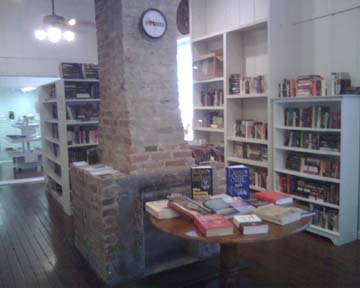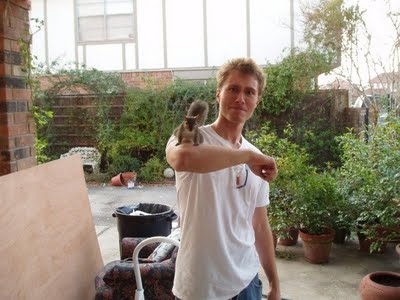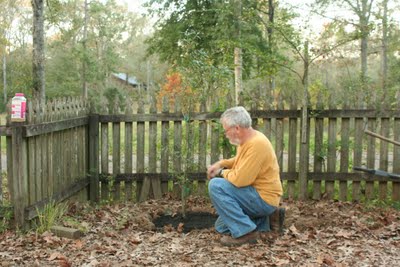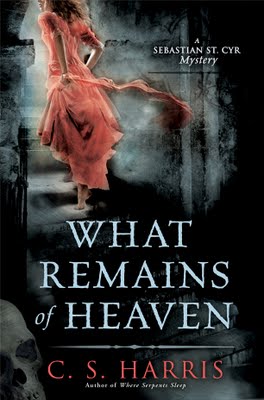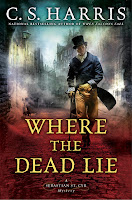It's hard to get back to work after such a totally relaxing break. We had a wonderful time up at the lake, touring plantations and planting climbing roses and honeysuckle around the house. Even the weather cooperated, with lovely clear blue skies and daytime temperatures in the 70s. Bliss.
Now, as promised, here is the beginning of the second chapter of
Where Shadows Dance. (And my apologies to everyone I made worry that I was about to kill off Gibson!)
CHAPTER TWOThe first rays of the rising sun caught the heavy mist off the river and turned it into shimmering wisps of gold and pink that hugged the soot-stained chimneys, church spires, and rooftops of the city. Standing beside his bedroom window, Sebastian St. Cyr, Viscount Devlin, cradled a glass of brandy in one hand. Behind him lay the tangled, abandoned ruin of his bed. He had not slept.
He was a tall man, leanly built. Not yet thirty years of age, he had dark hair and strange yellow eyes with an unnatural ability to see clearly at great distances or at night, when the world was reduced for most men to vague shadows of gray. Now, as the world outside the window brightened, he brought the brandy to his lips only to hesitate and set it aside untasted.
There were times when memories of the past tormented his sleep and drove him from his bed, times when his dreams echoed with the crash of cannonballs and the screams of mangled men, when the cloying scent of death haunted him and would not go away. But not this night. This night, he was troubled more by the present than the past. By a life-altering truth revealed too late and a future he did not want but was honor bound to embrace.
He reached again for his brandy, only to pause as the sound of frantic knocking reverberated though the house. Jerking up the sash, he leaned out, the cool air of morning biting his bare flesh as he shouted down at the figure on the steps below, “What the bloody hell do you want?”
The man’s head fell back, revealing familiar features. “That you, Devlin?”
“Gibson?” Sebastian was suddenly, painfully sober. “I’ll be right down.”
Pausing only to throw on a silk dressing gown, he hurried downstairs to find his majordomo, Morey, dressed in a paisley gown of astonishingly lurid reds and blues and clutching a flickering candle that tipped dangerously as he worked at drawing back the bolts on the front door.
“Go back to bed, Morey,” said Sebastian. “I’ll deal with this.”
“Yes, my lord.” A former gunnery sergeant, the majordomo gave a dignified bow and withdrew.
Sebastian yanked open the front door. His friend practically fell into the marble-floored entrance hall. “What the devil’s happened, Gibson? What is it?”
Gibson leaned against the wall. He was breathing heavily, his normally jaunty face haggard and streaked with sweat. From the looks of things, he hadn’t been able to find a hackney and had simply hurried the distance from the Tower to Mayfair on foot—not an easy journey for a man with a wooden leg.
He swallowed hard and said, “I have a wee bit of a problem.”
* * *
Sebastian stared down at the pale body stretched out on his friend’s granite slab and tried to avoid breathing too deeply.
The sun was up by now. The wind had blown away the clouds and the last of the mist to leave the sky scrubbed blue and empty. Already, the day promised to be warm. From the corpse before him rose a sickly-sweet odor of decay.
“You know,” said Sebastian, rubbing his nose, “if you’d left the man in his grave where he belonged, you wouldn’t have a problem.”
Gibson stood on the far side of the table, his arms folded at his chest. “It’s a little late now.”
Sebastian grunted. To some, they might seem unlikely friends, this Earl’s heir and the Irish surgeon with a passion for unraveling the secrets of the human body. But there had been a time when both had worn the King’s colors, when they’d fought together from the West Indies and Italy to the mountains of Portugal. Theirs was a friendship forged in all the horrors of blood and mud and looming death. Now, they shared a dedication to truth and a passionate anger at the wanton, selfish destruction of one human being by another.
Gibson scrubbed a hand across his lower face. “It’s not like I can walk into Bow Street and say, ‘By the way, mates, I thought you might be interested to know that I bought a body filched from St. George’s Churchyard last night. Yes, I know it’s illegal, but here’s the thing: it appears this gentleman whose friends all think died in his sleep was actually murdered.’ ”
Sebastian huffed a soft laugh. “Not if you value your life.”
The authorities tended to turn a blind eye to the activities of body snatchers, unless they were caught redhanded. But the inhabitants of London were considerably less sanguine about the unauthorized dissection of their nearest and dearest. When word spread of a body snatching, hordes of hysterical relatives had a nasty habit of descending on the city’s churchyards to dig up the remains of their loved ones. Since they frequently discovered only empty coffins and torn grave clothes, the resultant mobs then turned their fury on the city’s hospitals and the homes of known anatomists, smashing and burning, and savaging any medical men unlucky enough to fall into their clutches.
Gibson was well known as an anatomist.
Sebastian said, “Perhaps Jumpin’ Jack dug up the wrong body.”
Gibson shook his head. “I plan to check the rolls of mortality later today to make certain, but my money’s on Jumpin’ Jack. If he says this is Benjamin Knox, then this is Benjamin Knox.”
Sebastian walked around the table, his gaze on the pale corpse.
Gibson said, “Do you recognize him?”
“No. But then, to my knowledge I’ve never met anyone named Benjamin Knox.”
“I’m told he had rooms in St. James’s Street, above the
Je Reviens Coffeehouse.”
St. James’s was a popular locale for young gentleman. “Who told you he died of a defective heart?”
“A colleague of mine at St. Thomas’s—Dr. Anthony Cooper. He was called in to examine the body. Swore there were no signs of any violence or illness; the man was simply lying dead in his bed when his valet came to rouse him that morning. Cooper was convinced he must have had a weak heart. That’s why I was so anxious to dissect the body—to observe whatever malformation or damage might be present.”
Sebastian hunkered down to study the telltale slit at the base of the man’s skull. “Your Dr. Cooper obviously didn’t think to look at the back of his patient’s neck.”
“Obviously not. But surely there would have been traces of blood on the pillow and sheets?”
“If Mr. Knox were killed in his bed, yes. I suspect he was not.” Sebastian straightened and went to stand in the open doorway overlooking the unkempt garden that stretched from the stone outbuilding to the surgery beyond.
Gibson came to stand beside him. After a moment, the Irishman said, “Looks like a professional’s work, doesn’t it?”
“It does.”
“I can’t just pretend I didn’t see this.”
Sebastian blew out a long breath. “It’s not going to be easy, investigating a murder no one knows occurred.”
“But you’ll do it?”
Sebastian glanced back at the pallid corpse on Gibson’s dissection table. The man looked to be much the same age as Sebastian, and he found himself wondering if Knox had left a wife and children to mourn him. A mother? Perhaps a father. He should have had decades of rewarding life ahead of him. Instead he was reduced to this, a murdered cadaver on a surgeon’s slab. And Sebastian knew a deep and abiding fury directed toward whoever had brought Knox to this end.
“I’ll do it.”
